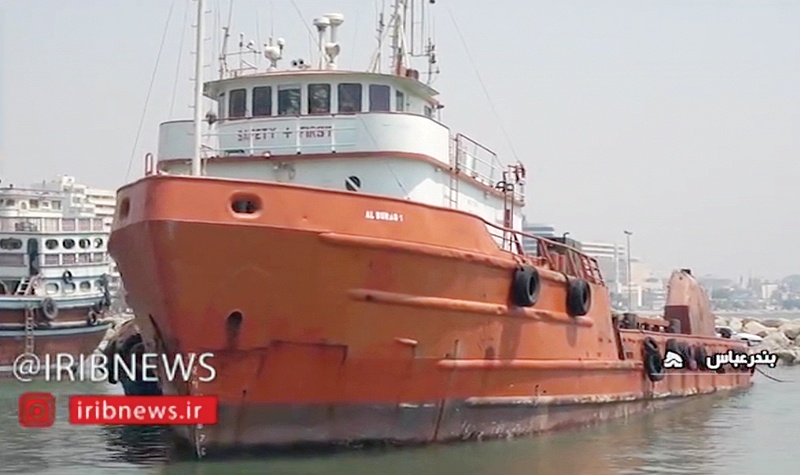Tehran fires up advanced centrifuges in latest nuclear step
TEHRAN: Iran seized a boat and arrested 12 Filipinos as it busted a "fuel-smuggling ring" in the Strait of Hormuz yesterday, the semi-official news agency ISNA reported. "A foreign tugboat was confiscated as well as 283,900 liters (75,000 gallons) of petrol worth 233.71 billion rials (about $2 million)," ISNA said, citing the coast guard chief in the southern province of Hormozgan.
"Twelve Philippine nationals were arrested and the relevant judiciary officials are currently taking the required legal measures," Major Hossein Dehaki was quoted as saying. Dehaki said the group was suspected of operating a fuel-smuggling ring and the confiscated shipment had been intercepted close to Sirik county in the Strait of Hormuz. The seizure comes amid tensions in the Gulf after the United States unilaterally withdrew from a nuclear deal putting curbs on Iran's nuclear program in return for relief from sanctions.
The escalation has seen ships mysteriously attacked, drones downed and oil tankers seized in the Strait of Hormuz - a chokepoint for a third of world's seaborne oil. Iran's Islamic Revolutionary Guard Corps detained a "foreign tanker" in Gulf waters on July 14 for allegedly smuggling contraband fuel. "With a capacity of two million liters and 12 foreign crew on board, the vessel was en route to deliver contraband fuel received from Iranian boats to foreign ships," the Guards said at the time.
Maritime tracking service TankerTrackers reported the Panamanian-flagged MT Riah, used in the strait for fuelling other vessels, had crossed into Iranian waters, and at that point its automatic identification system stopped sending signals. In the most high-profile seizure, the Guards impounded the British-flagged Stena Impero tanker in the Strait of Hormuz on July 19 for breaking "international maritime rules". Iran also seized another ship on July 31 with seven foreign crew onboard over fuel smuggling, but it has not revealed the vessel's identity or the nationality of its crew.

Latest nuclear step
In another development, Iran said yesterday it has fired up advanced centrifuges to boost its enriched uranium stockpiles, in the latest scaling back of commitments under a crumbling 2015 nuclear deal. The Islamic republic was acting on a threat to further abandon its nuclear commitments based on a deadline it set for European powers to do something to shield it from US sanctions.
The country's Atomic Energy Organization spokesman Behrouz Kamalvandi said it had activated 20 IR-4 and 20 IR-6 advanced centrifuges. "The centrifuge machines, as they are engaged in research and development, will help with increasing the stockpile," he said. "The capacity of these machines is many times more than the previous machines. This started as of yesterday (Friday)," he told a news conference in Tehran.
Under the 2015 Joint Comprehensive Plan of Action (JCPOA), Iran was allowed to enrich uranium using only first generation-or IR-1 - centrifuges. Tensions have been escalating between Iran and the United States since May last year when President Donald Trump pulled out of the accord and began reimposing sanctions that have crippled its economy. The arch-foes were on the cusp of confrontation in June when Iran downed a US drone and Trump ordered retaliatory strikes before cancelling them at the last minute.
Britain, France and Germany have repeatedly said they are committed to saving the deal that gave Iran relief from sanctions in exchange for curbs on its nuclear program, but their efforts have so far borne little fruit. Iran said yesterday it was capable of enriching uranium beyond 20 percent but for now it had no plans to do so. "Our plan is that if the other parties act on their commitments, we too return to our commitments," said Kamalvandi.
US 'not surprised'
US Defence Secretary Mark Esper said he was "not surprised that Iran has announced that it's going to violate the JCPOA". Britain called Iran's move "particularly disappointing at a time when we and our European and international partners are working hard to de-escalate tensions". Despite the decision to further step back from the 2015 deal, Kamalvandi said Iran would allow the International Atomic Energy Agency to continue monitoring its nuclear program, as it has done under the 2015 accord.
"Regarding the monitoring and accesses of the IAEA… so that everything is clear (Iran's) commitments regarding transparency will be followed as before," the spokesman said. The European Union on Friday emphasized its reliance on the IAEA to monitor Iran's activities as it voiced "great concern" over the country's decision to roll back its commitments.
In its latest report on August 30, the watchdog said it continues to verify compliance through cameras and on-site inspections. But in an apparent hint at worries about access it said "ongoing interactions… require full and timely cooperation by Iran". Yesterday, the UN atomic agency noted Iran's latest move and indicated its inspectors were ready to check its compliance. "Agency inspectors are on the ground in Iran and they will report any relevant activities to IAEA headquarters in Vienna," spokesman Fredrik Dahl said.
Europe 'must hurry'
Iran's new step came after Britain, France and Germany were unable to find a way to offset the impact of sanctions on the country before a September 7 deadline set by the Islamic republic. "If Europe wants to do something, it must hurry, because returning to the situation before reducing commitments could take time," Kamalvandi said. Tehran has already hit back twice with countermeasures in response to the US withdrawal from the 2015 deal.
On July 1, Iran said it had increased its stockpile of enriched uranium to beyond the 300-kilogram maximum set by the deal. A week later, it announced it had exceeded a 3.67-percent cap on the purity of its uranium stocks. Yesterday's developments came on the eve of a visit to Iran by the acting head of the IAEA, Cornel Feruta. Kamalvandi said Feruta would meet the head of Iran's Atomic Energy Organisation, Ali Akbar Salehi, and Foreign Minister Mohammad Javad Zarif.- Agencies




